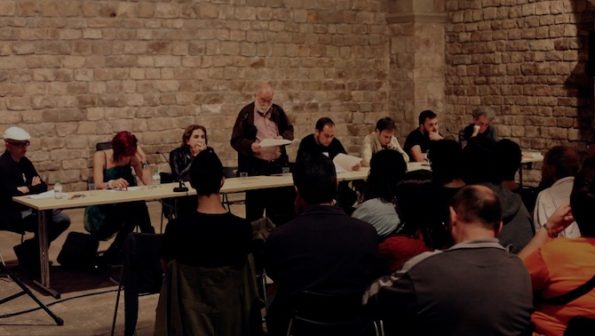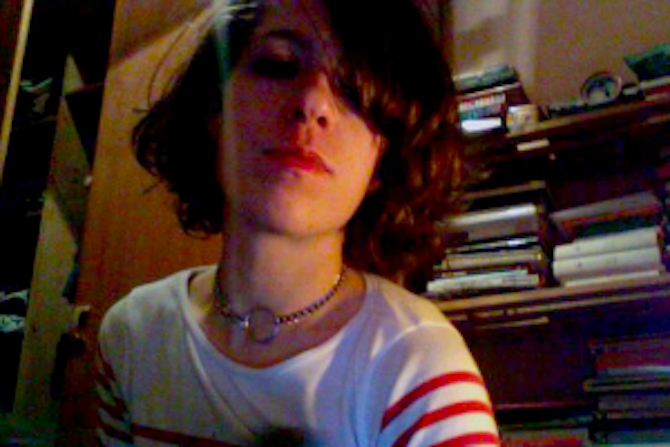Search
To search for an exact match, type the word or phrase you want in quotation marks.
A*DESK has been offering since 2002 contents about criticism and contemporary art. A*DESK has become consolidated thanks to all those who have believed in the project, all those who have followed us, debating, participating and collaborating. Many people have collaborated with A*DESK, and continue to do so. Their efforts, knowledge and belief in the project are what make it grow internationally. At A*DESK we have also generated work for over one hundred professionals in culture, from small collaborations with reviews and classes, to more prolonged and intense collaborations.
At A*DESK we believe in the need for free and universal access to culture and knowledge. We want to carry on being independent, remaining open to more ideas and opinions. If you believe in A*DESK, we need your backing to be able to continue. You can now participate in the project by supporting it. You can choose how much you want to contribute to the project.
You can decide how much you want to bring to the project.

Last Saturday 11 May a a citizens’ session . was called in La Capella, Barcelona. The posters advertising it figured some well-known names from the social movements: David Fernández, Ada Colau, Arcadi Oliveres and Jorge Luís Marzo, amongst others. Aside from a general interest in the sessions, I imagine that whoever went there did so with a definite intention, to deal with a specific subject. To listen to talk of education, health, culture, workers rights or housing.
In my case, my principal interest was in seeing what was said (once again) about culture: mapping out the political and economic interests behind the closure of programmes and centres; pointing to new possible strategies… In short talking about the sad, wounded animal that is culture in our country. Talking in general about our problems, our daily lives, the rights gained after long battles that we don’t want to lose, and calling for those still pending.
But these sessions didn’t talk about our problems. This afternoon those of others were discussed, the unknown, those without a name. Alternating, David Fernández; Andrés G. Berrio; Marcelo Expósito; Arcadi Oliveres; Ada Colau; Jaume Asens; Jorge Luís Marzo and Veronika Arauzo took it in turns, each after a short introduction, to begin to read part of a list.
In a neutral and methodical manner, each one of the speakers read out a series of data that referred to people who have disappeared or died at the frontiers of Europe. The reading was cold and objective, the information always being given in the same order: date, number of bodies, country of origin, name and cause of death. There were 15.518 people without a name, registered as N.N (no name), dead at the doors of our society of welfare state in decline.
As time passed and the enumeration of data continued, many people amongst those attending began to fret. Some left before it ended. At the door, two girls handed out a huge poster with the same list of 15.518 N.N that was being read out in the space. A poster to take away, a memory of what doesn’t want to be seen or known: the anonymous corpses that pile up at our frontiers. There were people who felt cheated, offended. As if they’d been promised a show with ‘rock stars’ of the social movements, interesting discussions for committed citizens, the day to day social reality and all very well explained. Deception, on discovering, that the speakers only dedicated themselves to reading a list. I had also gone to see what they talked about in these sessions, hoping that Jorge Luís Marzo would say some interesting things. But this day it was the turn of “sod the public’’. After a while I realised that I wouldn’t have to write an article about the dismantling of culture and degradation of art. Here what was taking place was an art project by Daniela Ortiz and Xosé Quiroga.
N.N were also the initials of “Nacht und Nebel” (Night and fog), a decree of the Third Reich that consisted in programmes for making prisoners of war, and in general suspicious people from occupied countries, “disappear”.
Power today also acts by night: through thick smoke screens, hidden and without a head to decapitate. And it also murders, smuggles, liquidates and erases facts and people, leaving no traces or clues. There are no official data for how many people die trying to cross the frontiers. The figures gathered for this project, were facilitated by the British NGO United against racism, based on the scant police reports and press releases that can be found.
The deaths at the frontiers don’t count, because frontiers are not places and the bodies drowned in the sea crossing in dinghies don’t have a name. As they aren’t anybody they aren’t visible, their struggle isn’t ours and their rights don’t form part of our rhetoric or those of the social movements.
I’m not aiming to fall into the easy discourse of saying, that given there is always someone much worse off, to worry about the closure of an art centre is a bourgeois pastime, or that questions such as feminism are a sport for the rich. But it is worth reflecting on what we call the welfare society; what rights we refuse to lose and which are still to be claimed. Even more so now that everything is so obscenely explicit and we know that we also don’t count for those who run this whole set-up. For the vultures that govern us we are also N.N, just figures and statistics worth nothing more than to feed a crazed monster.
Maybe what is still pending are these and other political alliances with those who are really outwith the system, those who embody otherness with their own body and life. To be in this crap system and not see that the oppression of others is also our own, is like being the employee of a hotel and thinking you own it.
The project N.N 15.518, by Daniela Ortiz and Xosé Quiroga can be seen in La Capella as of this afternoon .

Irina Mutt she keeps on quoting Annie Sprinkle.
"A desk is a dangerous place from which to watch the world" (John Le Carré)